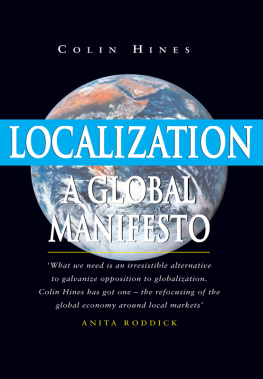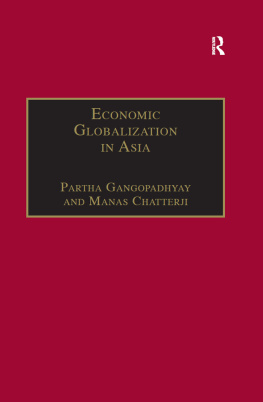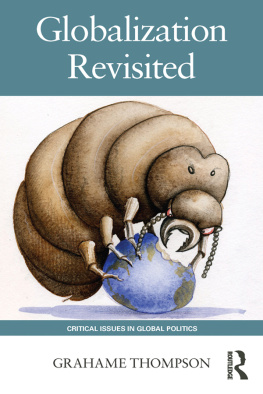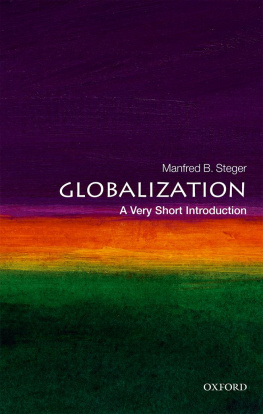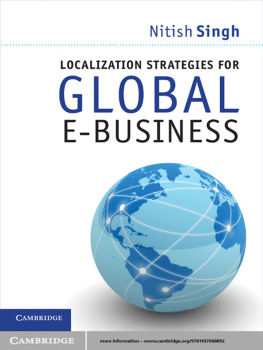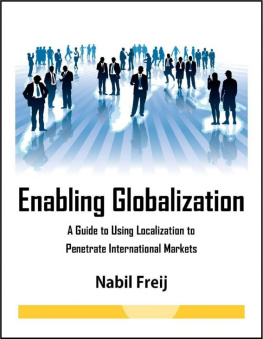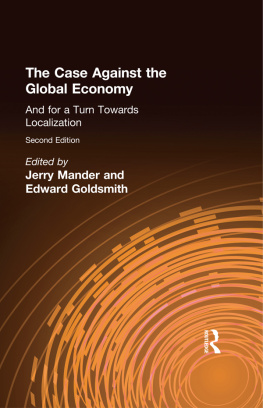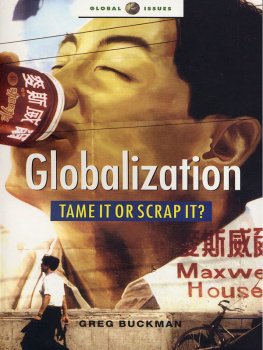Dedicated to my much missed father Tom Hines.
Also for my mother Lillian, my wife Ann and children Clare and Pip
First published by Earthscan in the UK in 2000
Reprinted 2001, 2007
Copyright Colin Hines, 2000
All rights reserved
A catalogue record for this book is available from the British Library
ISBN: 978-1-85383-612-1
Typeset by MapSet Ltd, Gateshead, UK
Cover design by Andrew Corbett
For a full list of publications please contact:
Earthscan
2 Park Square, Milton Park, Abingdon, Oxfordshire OX14 4RN
Simultaneously published in the USA and Canada by Earthscan
711 Third Avenue, New York, NY 10017
Earthscan is an imprint of the Taylor & Francis Group, an informa business
Contents
This book is the result of endless conversations, discussions and arguments with many friends and colleagues. The biggest debt of constant gratitude is to my fellow new protectionist heretic Tim Lang, who kept the faith despite having a four letter word (Prof) placed in front of his name. Also lured into day-long discussions about the potential shape of this localization alternative were Nick Hildyard and Alan Simpson MP. This book would not have happened without the invaluable ideas and encouragement of the three of them.
The second great debt is to Jerry Mander and Doug Tompkins for setting up the International Forum on Globalization (plus Debi Barker, Shawnee Hoover and Victor Menotti). This network has allowed me access to many of the key people in the world working against global-ization. I would particularly like to mention those members who I have spent most time with discussing my ideas and in the process ruthlessly stealing theirs (suitably referenced of course): Maude Barlow, Harriet Barlow, Walden Bello, Agnes Bertrand, Brent Blackwelder, John Cavanagh, Tony Clarke, Herman Daly, Ramon Duran, Susan George, Teddy Goldsmith, Richard Grossman, Randy Hayes, Martin Khor, Andy Kimbrell, David Korten, Sara Larrain, Anuradha Mittal, David Morris, Helena Norberg-Hodge, Jean-Pierre Page, Carl Pope, Jeremy Rifkin, Mark Ritchie, Wolfgang Sachs, Vandana Shiva, Steven Shrybman, Lori Wallach and Tracy Worcester.
Others who played an important part in providing inputs for the book included: Charlie Arden-Clarke, David Baldock, Catherine Barr, Kevin Bundell, Tord Bjork, Stewart Boyle, Gabriel Chanan, Barry Coates, Pat Conarty, Chris Fisher, Shaun Geoghegans, Arthur Fountain, Ronnie Hall, Olivier Hoedeman, Paul Hohnen, Charlie Kronick, Jeremy Leggett, John Lovering, Caroline Lucas, Duncan McLaren, Ed Mayo, Brian Padgett, Andy Rowell, Michael Shuman, Andrew Simms, Richard Tapper, Thomas Wallgren, Erik Wesselius, David Wheeler, Alex Wilks, Angela Wood, Jessica Woodroffe.
Doug and Steve Hellinger and Fred OReagan, co-founders of the Development Group for Alternative Policies were amongst the first people I shared new protectionist ideas with nearly 20 years ago.
Thanks also to the indulgence shown by Jonathan Sinclair Wilson and the rest of the Earthscan team as deadline after deadline slipped. True patience was also exhibited by Kath and Geoff Tansey, the stalwalt and punctilious editors.
Finally, I would like to thank my friend and uncompromising mentor of decades Teddy Goldsmith, for encouraging the Goldsmith Foundation to financially support me during the writing of this book. (with the help of Jon Cracknell and Zac Goldsmith). Thanks also to the Polden Puckham Foundation and Network Foundation for funding the unfashionable.
These funders have allowed me to have to commute only as far as my art deco loft/eyrie in order to write this book. My family has thus had the dubious pleasure of me being around most days. However my working from home has allowed me to partake of my only practical contribution to localization chairing my childrens school PTA.
As ever the book is my responsibility entirely.
Globalization is not a policy choice, it is a fact.
Bill Clinton
Globalization is irreversible and irresistible.
Tony Blair
This book is an attempt to provide an optimistic alternative to the statements of Mr Clinton and Mr Blair above. They represent a fatalism that grips not just politicians. Far too many concerned citizens and organizations working for a fairer world also seem to have been bamboozled into accepting globalization and international competitiveness as inevitable. Yet these are not God given. Indeed the briefest perusal of the Bibles Ten Commandments reveals that there is not a single Commandment saying, Thou shalt be internationally competitive. Its a modern construct, elevated to a theology.
Localization: A Global Manifesto has been written to contribute to a mindwrench. This involves a move away from acquiescence to the new theology of globalization towards considering the possibility of its replacement with a localism that protects and rebuilds local economies worldwide. This mindwrench requires courage, almost of the order of an economic coming out, in order to reject the orthodoxys ceaseless mantra chant of the need for international competitiveness. It needs to challenge head on this constant reiteration by a self-serving priesthood of mainstream economists, commentators and the new masters of the universe big business leaders and international financiers.
The clarion call to be internationally competitive has become so powerful that it has infected the thinking of those who should know better. These include trades unionists, small businesspeople, farmers, and those concerned about making commerce more ethical and environmental. All seem duty bound to pepper their public utterances with fervent assurances that were their aims to be achieved, then it will hurry society further down the path to competitiveness.
The global commandment that every nation must contort its economy to outcompete every other countrys is an economic, social and environmental nonsense. It is a beggar-your-neighbour act of economic warfare. There have to be losers, because no matter how much a specific market may be growing, if its needs can be supplied by a competing range of outside sources, then large numbers, often the domestic producers, have to lose.
The alternative is that everything that could be produced within a nation or region should be. Long-distance trade is then reduced to supplying what could not come from within one country or geographical grouping of countries. This would allow an increase in local control of the economy and the potential for it being shared out more fairly, locally. Technology and information would be encouraged to flow, when and where they could strengthen local economies. Under these circumstamces, beggar-your-neighbour globalization gives way to the potentially more cooperative better-your-neighbour localization.
of this book defines globalization and localization and briefly catalogues the adverse effects of globalization on society, equity and the environment. It then debunks the myth that concentrating on the cheapest supply source is nationally and globally efficient (comparative advantage) and the idea, already in tatters thanks to the Asian economic crisis, that money should flow unfettered in order to make the world run more effectively (capital advantage).
Next page
